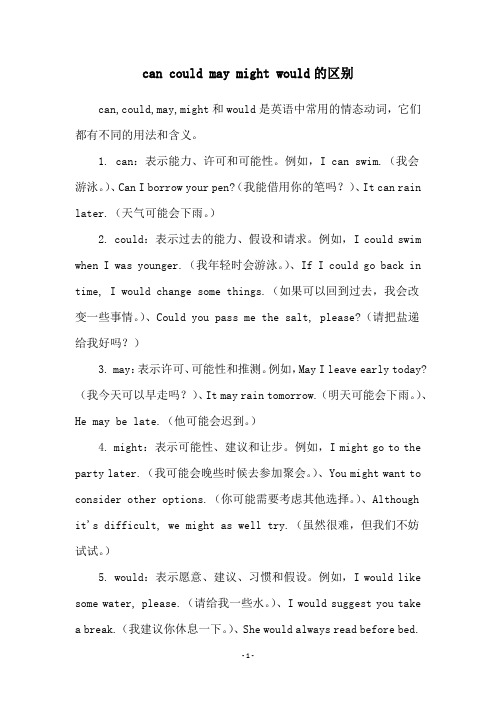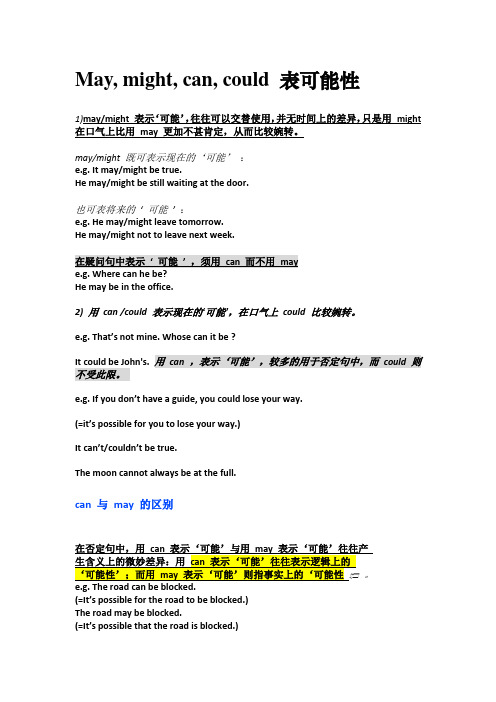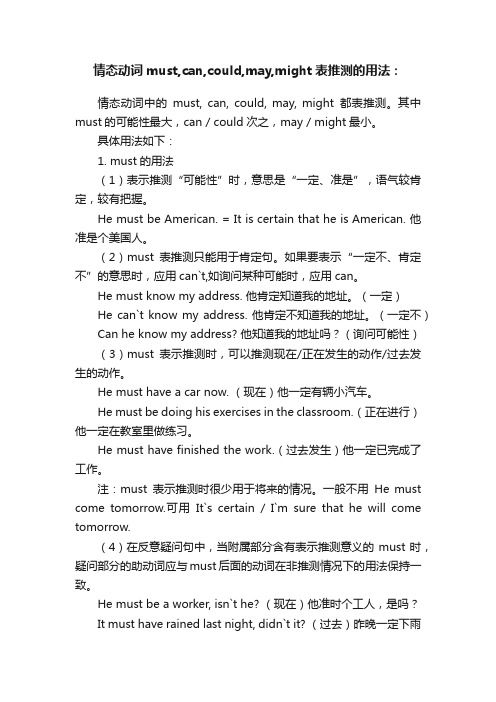最新can,could和may,might的用法
情态动词must, can, could, may, might表推测的用法

1. must的用法
表示推测“可能性”时,意思是“一定、准 是”,语气较肯定,较有把握。表推测只能 用于肯定句,可以推测现在/正在发生的动作 /过去发生的动作。 He must be American.他准是个美国人。
= It is certain that he is American.
He must be doing his exercises in the classroom (正在进行)他一定在教室里做练习。
2. can / could的用法
can 表示推测“可能性”时,往往用于否定句 或疑问句,can’t“一定不”,语气很肯定, can 在疑问句中意思是“会、可能”;could 可用于表示某事有可能发生或可能是事实。 He can’t be at home. 他一定不在家。
She might not come this afternoon. (将来)她今天下午可能不来了。
= It is impossible that he is at home.
The plane could be delayed by fog. 飞机可能会因为雾晚点。
3. may和might的法
may, might表示推测“可能性”时,意思是 “可能”、“也许”,可以推测现在正在发 生的动作或过去发生的动作和将来的情况, 语气没有 must肯定。可以用于否定句,意思 是“可能不、也许不”,但不用于疑问句。 might 不表示过去时态,只是语气上比may更 委婉,表示的可能性更小。
He may / might be American.他可能是个美国人。 = It is possible that he is American. He may / might not be at home. 他也许不在家。 He may / might be sleeping now. (现在)他可能正在睡觉。
可能性情态动词用法的基本概述

可能性情态动词用法的基本概述可能性情态动词是英语语法中的一类特殊动词,用于表示说话人对某种情况的可能性评估或推测。
在英语中,主要有四个可能性情态动词,它们分别是"can"、"could"、"may"和"might"。
本文将对这四个情态动词的用法进行详细说明和解释。
一、"Can"的用法"Can"是最常用的可能性情态动词,它表示一种肯定的可能性。
它的基本句型是主语 + "can" + 动词原形。
例如:"She can swim."(她会游泳。
)"Can"也可以用于提出疑问和否定句。
在疑问句中,"can"位于主语之前。
例如:"Can you speak French?"(你会说法语吗?)在否定句中,"can"前加上"not"构成"cannot"或缩写形式"can't"。
例如:"I cannot understand the instructions."(我不能理解这些说明。
)二、"Could"的用法"Could"是"can"的过去式,在表示可能性时,"could"常用于过去形式的语句或假设条件下。
它常被用于委婉地请求、征求意见或表示礼貌。
与"can"一样,"could"也可以用于提问和否定句。
例如:"Could you pass me the salt, please?"(请你递给我盐好吗?)"How could I forget your birthday?"(我怎么可能忘记你的生日呢?)"I couldn't believe my eyes!"(我简直不敢相信我的眼睛!)三、"May"的用法"May"同样表示可能性,但程度较不确定。
can could may might would的区别

can could may might would的区别can,could,may,might和would是英语中常用的情态动词,它们都有不同的用法和含义。
1. can:表示能力、许可和可能性。
例如,I can swim.(我会游泳。
)、Can I borrow your pen?(我能借用你的笔吗?)、It can rain later.(天气可能会下雨。
)2. could:表示过去的能力、假设和请求。
例如,I could swim when I was younger.(我年轻时会游泳。
)、If I could go back in time, I would change some things.(如果可以回到过去,我会改变一些事情。
)、Could you pass me the salt, please?(请把盐递给我好吗?)3. may:表示许可、可能性和推测。
例如,May I leave early today?(我今天可以早走吗?)、It may rain tomorrow.(明天可能会下雨。
)、He may be late.(他可能会迟到。
)4. might:表示可能性、建议和让步。
例如,I might go to the party later.(我可能会晚些时候去参加聚会。
)、You might want to consider other options.(你可能需要考虑其他选择。
)、Although it's difficult, we might as well try.(虽然很难,但我们不妨试试。
)5. would:表示愿意、建议、习惯和假设。
例如,I would like some water, please.(请给我一些水。
)、I would suggest you take a break.(我建议你休息一下。
)、She would always read before bed.(她习惯在睡前阅读。
常用的情态动词八个用法

常用的情态动词八个用法情态动词是英语中非常重要的一类动词,它们可以用来表达说话者的态度、意愿、推测、建议等。
在英语中,常用的情态动词有八个,分别是can、could、may、might、shall、should、will和would。
下面我们来看看这八个情态动词的用法。
1. Can和CouldCan和could都表示能力或可能性。
Can表示现在的能力或可能性,而could则表示过去的能力或可能性。
例如:- I can speak English.(我会说英语。
)- When I was young, I could run very fast.(我小时候跑得很快。
)2. May和MightMay和might都表示可能性,但may的可能性更大一些。
例如:- It may rain tomorrow.(明天可能会下雨。
)- He might be late.(他可能会迟到。
)3. Shall和ShouldShall和should都表示建议或义务。
Shall用于第一人称,should 用于第二人称和第三人称。
例如:- Shall we go to the cinema tonight?(今晚我们去看电影好吗?)- You should study harder.(你应该更加努力学习。
)4. Will和WouldWill和would都表示意愿或推测。
Will表示现在或将来的意愿或推测,而would则表示过去或虚拟的意愿或推测。
例如:- I will help you with your homework.(我会帮你做作业。
)- If I had more time, I would travel around the world.(如果我有更多时间,我会周游世界。
)情态动词在英语中是非常重要的一类动词,掌握它们的用法对于学好英语非常有帮助。
may,might,could表可能性用法

May, might, can, could 表可能性1)may/might 表示‘可能’,往往可以交替使用,并无时间上的差异,只是用might 在口气上比用may 更加不甚肯定,从而比较婉转。
may/might 既可表示现在的‘可能’:. It may/might be true.He may/might be still waiting at the door.可能’ 也可表将来的‘ :. He may/might leave tomorrow.He may/might not to leave next week.,须用can 而不用may可能’ 在疑问句中表示‘ . Where can he beHe may be in the office.2)用can /could 表示现在的‘可能’,在口气上could 比较婉转。
. That’s not mine. Whose can it beIt could be John's. 用can ,表示‘可能’,较多的用于否定句中,而could 则不受此限。
. If you don’t have a guide, you could lose your way.(=it’s possible for you to lose your way.)It can’t/couldn’t be true.The moon cannot always be at the full.can 与may 的区别在否定句中,用can 表示‘可能’与用may 表示‘可能’往往产生含义上的微妙差异:用can 表示‘可能’往往表示逻辑上的‘可能性’;而用may 表示‘可能’则指事实上的‘可能性。
. The road can be blocked.(=It’s possible for the road to be blocked.)The road may be blocked.(=It’s possible that the road is blocked.)Another example:Mr. Reed is in poor health. He can be ill at any time.Mr. Reed looks pale. He may be ill.3)表示过去的‘可能’,可用‘may/might+ 不定式完成体或不定式完成进行体’ ,在这里用may/might ,也只有口气上婉转程度的差异,而没有时间上的区别:. He may/might have been hurt.She may/might have missed the train.也用‘can/could+ 不定式完成体’ 表示过去的‘可能’. He can’t/couldn’t have been hurt.She can’t/couldn’t have missed the train.用‘might/could+ 不定式完成体’ 有时可以表示本来可能发生但没有发生的,或者本来可能完成却没有完成的动作。
can,could,may,might,must表示推测的用法

can,could,may,might,must表示推测的用法
1)情态动词+动词原形。
表示对现在或将来的情况的推测,此时动词通常为系动词。
I don't know where she is, she may be in Wuhan.
2)情态动词+动词现在进行时。
表示对现在或将来正在进行的情况进行推测。
At this moment, our teacher must be correcting our exam papers.
这时,我们老师想必在批改试卷。
3)情态动词+动词完成时。
表示对过去情况的推测。
We would have finished this work by the end of next December.
明年十二月底前我们很可能已完成这项工作了。
The road is wet. It must have rained last night.
地是湿的,昨天晚上一定下雨了。
4)情态动词+动词的现在完成进行时。
表示对过去正在发生事情的推测。
Your mother must have been looking for you.
你妈妈一定一直在找你。
5)推测的否定形式,疑问形式用can't, couldn't表示。
Mike can't have found his car, for he came to work by bus this morning.
迈克一定还没有找回他的车,因为早上他是坐公共汽车来上班的。
注意:could, might表示推测时不表示时态,其推测的程度不如can, may。
May,might, could表可能性用法

May, might, can, could 表可能性1)may/might 表示‘可能’,往往可以交替使用,并无时间上的差异,只是用might 在口气上比用may 更加不甚肯定,从而比较婉转。
may/might 既可表示现在的‘可能’:e.g. It may/might be true.He may/might be still waiting at the door.也可表将来的‘ 可能’ :e.g. He may/might leave tomorrow.He may/might not to leave next week.He may be in the office.2)用can /could 表示现在的‘可能’,在口气上could 比较婉转。
e.g. That’s not mine. Whose can it be ?It could be John's. 用can ,表示‘可能’,较多的用于否定句中,而could 则不受此限。
e.g. If you don’t have a guide, you could lose your way.(=it’s possible for you to lose your way.)It can’t/couldn’t be true.The moon cannot always be at the full.can 与may 的区别(=It’s possible for the road to be blocked.)The road may be blocked.(=It’s possible that the road is blocked.)Another example:Mr. Reed is in poor health. He can be ill at any time.Mr. Reed looks pale. He may be ill.She may/might have missed the train.She can’t/couldn’t have missed the train.用‘might/could+ 不定式完成体’ 有时可以表示本来可能发生但没有发生的,或者本来可能完成却没有完成的动作。
情态动词can (could), may (might) 等的用法

情态动词有can (could), may (might), must, have to, shall (should, will (would), dare (dared), need (needed), ought to等。
情态动词无人称和数的变化;不能单独使用,必须与其后的动词原形构成谓语一、can, could1) 表示能力(体力、知识、技能)。
Can you lift this heavy box?(体力)Mary can speak three languages.(知识)Can you skate?(技能)此时可用be able to代替。
Can只有一般现在时和一般过去式;而be able to则有更多的时态。
I’ll not be able to come this afternoon.当表示“经过努力才得以做成功某事”时应用be able to,不能用Can。
如:He was able to go to the party yesterday evening in spite of the heavy rain.2) 表示请求和允许。
-----Can I go now?----- Yes, you can. / No, you can’t.此时可与may互换。
在疑问句中还可用could,might代替,不是过去式,只是语气更委婉,不能用于肯定句和答语中。
---- Could I come to see you tomorrow?---- Yes, you can. ( No, I’m afraid not. )3) 表示客观可能性(客观原因形成的能力)。
They’ve changed the timetable, so we can go by bus instead.This hall can hold 500 people at least.4) 表示推测(惊讶、怀疑、不相信的态度),用于疑问句、否定句和感叹句中。
情态动词can (could), may (might) 等的用法

情态动词有can (could), may (might), must, have to, shall (should, will (would), dare (dared), need (needed), ought to等。
情态动词无人称和数的变化;不能单独使用,必须与其后的动词原形构成谓语一、can, could1) 表示能力(体力、知识、技能)。
Can you lift this heavy box?(体力)Mary can speak three languages.(知识)Can you skate?(技能)此时可用be able to代替。
Can只有一般现在时和一般过去式;而be able to则有更多的时态。
I’ll not be able to come this afternoon.当表示“经过努力才得以做成功某事”时应用be able to,不能用Can。
如:He was able to go to the party yesterday evening in spite of the heavy rain.2) 表示请求和允许。
-----Can I go now?----- Yes, you can. / No, you can’t.此时可与may互换。
在疑问句中还可用could,might代替,不是过去式,只是语气更委婉,不能用于肯定句和答语中。
---- Could I come to see you tomorrow?---- Yes, you can. ( No, I’m afraid not. )3) 表示客观可能性(客观原因形成的能力)。
They’ve changed the timetable, so we can go by bus instead.This hall can hold 500 people at least.4) 表示推测(惊讶、怀疑、不相信的态度),用于疑问句、否定句和感叹句中。
情态动词must。can。could。may。might表推测的用法

情态动词must。
can。
could。
may。
might表推测的用法情态动词can / could表示推测时,意思是“可能、有可能”,语气比must弱。
XXX用于现在和将来,could用于过去。
1)表示可能性时,can / could后面接动词原形。
He canbe American。
= It is possible that he is American.他可能是个美国人。
2)表示不可能性时,用XXX。
He can`t be American。
=It is impossible that he is American.他不可能是个美国人。
3)can / could还可以表示“会、能够”的意思。
He can speak Chinese.他会说中文。
4)在疑问句中,XXX表示请求、允许、建议等意义。
Can you help me?你能帮我吗?Could you please pass me the salt?你能把盐递给我吗?3.may / might的用法1)may / might表示推测时,意思是“可能性很小”,语气比can / could更弱。
He may be American。
= It is possible thathe is American。
but the possibility is small.他可能是个美国人,但可能性很小。
2)may / might还可以表示请求、许可、建议等意义。
May I use your phone?我可以用你的电话吗?Might I suggest a different approach?我可以建议一种不同的方法吗?3)在虚拟语气中,XXX表示“可能性很小,甚至不可能”,表示一种假设的情况。
If I had studied harder。
I might have passed the exam.如果我学得更努力,我可能会通过考试。
总之,情态动词must。
cancouldmaymight的区别与用法

cancouldmaymight的区别与用法一、Can的用法(一)基本用法1. Can表示能力,即某人“能”或“会”做某事。
- I can speak English fluently. It's so cool! (我能流利地说英语。
太酷了!)- He can run really fast. He's like a cheetah! (他能跑得非常快。
他就像一只猎豹!)2. Can用于请求许可,通常用于非正式场合。
- Can I have a glass of water? I'm so thirsty. (我能喝杯水吗?我太渴了。
)- Can we go to the park today? It would be so much fun. (我们今天能去公园吗?那会很有趣的。
)3. Can表示可能性,常用于否定句和疑问句中。
- It can't be true. That's just too crazy! (这不可能是真的。
那太疯狂了!)- Can it rain tomorrow? I hope not. I want to go for a hike. (明天会下雨吗?我希望不会。
我想去徒步旅行。
)(二)固定搭配1. Can't help doing sth. 忍不住做某事- She can't help laughing when she sees the funny video. (当她看到这个搞笑的视频时,她忍不住笑了。
)2. Can't wait to do sth. 迫不及待做某事- I can't wait to open my birthday presents. I'm so excited! (我迫不及待地想打开我的生日礼物。
我太兴奋了!)二、Could的用法(一)基本用法1. Could是Can的过去式,表示过去的能力。
cancould和maymight的用法

说说can和mayБайду номын сангаас兄弟
一、表示能力 Can you come to the party tomorrow?你明天能来参加我们 的聚会吗? Could you speak English then?那时候你会说英语吗? 二、表示许可 Can [Could] I come in?我可以进来吗?(could更委婉) “Could [Can] I use your pen? ” “Yes, of course you can.” “我可以借用你的钢笔吗?”“当然可以。”(不能 说Yes, you could.) 三、表示推测 It can’t be true.那不可能是真的。 We could go there this summer.今年夏天我们可能要去那儿。 He could have gone home.他可能已回家了。 四 ,“can”表达可能性句型 (若要表示不可能用can‘t) 例:You can get there in 20 minutes' walk. (走二十分钟你就能够到达那里。)
重难点解析
5 比较have to和must
两词都是‘必须’的意思,have to 表示客观的需要, must 表示说话人主观上的看法,既主观上的必要。 My brother was very ill, so I had to call the doctor in the middle of the night. 我弟弟病得很厉害,我只得半 夜里把医生请来。(客观上需要做这件事) He said that they must work hard. 他说他们必须努力工 作。(主观上要做这件事) have to有人称、数、时态的变化,而must只有一种形式。 但must 可用于间接引语中表示过去的必要或义务。 He had to look after his sister yesterday.
初中情态动词用法总结

初中情态动词用法总结情态动词是用来表达说话人的态度、情感和推测等的特殊动词。
情态动词包括can、could、may、might、must、shall、should、will、would、ought to等。
以下是初中情态动词的用法总结:1. Can和Could:- 表示能力、技能、许可或请求的可能性:I can swim.(我会游泳。
)Could you open the door for me, please?(请你开门好吗?)- 表示可能性或推测:It can't be true.(那不可能是真的。
)Could he be the one who took my book?(他可能是拿走了我的书的那一个人吗?)2. May和Might:- 表示许可、请求或可能性:May I use your pen?(我可以用你的笔吗?)She might be late.(她可能会迟到。
)- 表示祝愿或警告:May you have a happy birthday!(祝你生日快乐!)You may get hurt if you do that.(你这样做可能会受伤。
)3. Must:- 表示推测或肯定:It must be raining outside.(外面肯定在下雨。
)- 表示义务或责任:You must finish your homework before going out to play.(出去玩之前你必须完成作业。
)4. Shall和Should:- 表示提议、请求、建议或义务:Shall we go to the park together?(我们一起去公园好吗?)You should study harder for the test.(你应该更努力地学习应考试。
)5. Will和Would:- 表示将来的意愿、决心或意志:I will help you with your project.(我会帮助你完成你的项目。
情态动词must, can, could, may, might表推测的用法

= It is certain that he is ห้องสมุดไป่ตู้merican.
He must be doing his exercises in the classroom (正在进行)他一定在教室里做练习。
She might not come this afternoon. (将来)她今天下午可能不来了。
2. can / could的用法
can 表示推测“可能性”时,往往用于否定句 或疑问句,can’t“一定不”,语气很肯定, can 在疑问句中意思是“会、可能”;could 可用于表示某事有可能发生或可能是事实。 He can’t be at home. 他一定不在家。
= It is impossible that he is at home.
The plane could be delayed by fog. 飞机可能会因为雾晚点。
3. may和might的用法
may, might表示推测“可能性”时,意思是 “可能”、“也许”,可以推测现在正在发 生的动作或过去发生的动作和将来的情况, 语气没有 must肯定。可以用于否定句,意思 是“可能不、也许不”,但不用于疑问句。 might 不表示过去时态,只是语气上比may更 委婉,表示的可能性更小。
maymightmaymight表示推测可能性时意思是可能也许可以推测现在正在发生的动作或过去发生的动作和将来的情况语气没有must肯定
情态动词中的must, can, could, may, might都表推测。其中must的可能性最 大,can / could次之,may / might最小。
情态动词must,can,could,may,might表推测的用法:

情态动词must,can,could,may,might表推测的用法:情态动词中的must, can, could, may, might都表推测。
其中must的可能性最大,can / could次之,may / might最小。
具体用法如下:1. must的用法(1)表示推测“可能性”时,意思是“一定、准是”,语气较肯定,较有把握。
He must be American. = It is certain that he is American. 他准是个美国人。
(2)must表推测只能用于肯定句。
如果要表示“一定不、肯定不”的意思时,应用can`t,如询问某种可能时,应用can。
He must know my address. 他肯定知道我的地址。
(一定)He can`t know my address. 他肯定不知道我的地址。
(一定不)Can he know my address? 他知道我的地址吗?(询问可能性)(3)must表示推测时,可以推测现在/正在发生的动作/过去发生的动作。
He must have a car now. (现在)他一定有辆小汽车。
He must be doing his exercises in the classroom.(正在进行)他一定在教室里做练习。
He must have finished the work.(过去发生)他一定已完成了工作。
注:must表示推测时很少用于将来的情况。
一般不用He must come tomorrow.可用It`s certain / I`m sure that he will come tomorrow.(4)在反意疑问句中,当附属部分含有表示推测意义的must时,疑问部分的助动词应与must后面的动词在非推测情况下的用法保持一致。
He must be a worker, isn`t he? (现在)他准时个工人,是吗?It must have rained last night, didn`t it? (过去)昨晚一定下雨了,是不是?You must have learned English for many years, haven`t you? (完成时)你一定学了好多年英语,是吗?2. can / could的用法(1)can表示推测“可能性”时,往往用于否定句或疑问句。
can,could和may,might的用法

may与might
BACK
• may , might 或许,可能,可以 (might可以看作是may的过去式, 这
• 两个词除了时态不相同外,在表达意思的许多方面是相近的。当然 • may 和might又都有一些各自不同的独特用法。) • 1)表可能性 • I may be busy from tomorrow on .从明天起我可能会忙起来。
Can和may的共同特征 Can和may的相似处 Can与may的区别
典型例题
Can的用法
(1)“can”表达能力句型
例:I can do it in another way. (我能以别的方法来做这件事。)
(2)“can”表达许可 例:Can I use your telephone?(我可以借用你的电话吗?) Yes, of course you can.(可以呀,当然可以。) 解说 表达许可基本上可分为“请求”和“准许”两种。 (3)“can”表达可能性句型 (若要表示不可能用can‘t)
③ 表示“差点儿就要”:
I was so angry I could have killed him.我是那样生气,差点把他杀了。
•
May的用法
• (1)“may”表达许可
• 例:May I come in?(我可以进来吗?)
• (2)“may”表达可能性
• 例:The news may be true.(或许这消息是真的。)
例:You can get there in 20 minutes' walk.
(走二十分钟你就能够到达那里。) (4)“can”表达推测
例:Can the news be true?(这消息会是真的吗?) The news can't be true.(这消息不会是真的吧。)
- 1、下载文档前请自行甄别文档内容的完整性,平台不提供额外的编辑、内容补充、找答案等附加服务。
- 2、"仅部分预览"的文档,不可在线预览部分如存在完整性等问题,可反馈申请退款(可完整预览的文档不适用该条件!)。
- 3、如文档侵犯您的权益,请联系客服反馈,我们会尽快为您处理(人工客服工作时间:9:00-18:30)。
典型例题
BACK
• 练习1:用can或may填空。
• 1.__C_an___ you paint? No, I __c_an_’_t __.
• A: No. it isn’t there. • 5.__M_ay___ you have a good time.
练习2:选择题
1、The light in the office is still on. Mr. White ____be in.
A must B may C can
解析:The light in the office is still on.是说:办公 室里的等还在亮着.这样分析是别人看到的灯在 亮着,当然这个人不在办公室里,也没有进入办公 室里,就好像放学后,你看见五楼的办公室亮着,但 你不知道办公室里是否有人,有几个人,所以会进 行种种猜测.此题答案B. A的答案不对,如果是must be,此题翻译成:办公室 的灯还亮着,Mr White 一定在里面.故与前面The light in the office is still on.矛盾.而may be 表示 猜测,大概也许的意思在此题中比must be的肯定 意思更经准一些.
can,could和may,might的用法
Can 和 may
Can的用法 can与could May的用法 may与might
Can和may的共同特征 Can和may的相似处 Can与may的区别
典型例题
Can与may的区别 BACK
• 虽说兄弟之间有相似之处,但他们的个性还是非 常鲜明的:
• 1.能力超群,刚性十足的can。作为大哥的can, 在表示能力,意为“能、会”方面,还是有很强 的实力的。
• 如:Can you play the guitar? 你会弹吉它吗? • Yes,I can. 是,我会/No,I can’t. 不,我不会。 • 2.感情细腻,亲情十足的may。作为弟弟的may,
• 5. Look out!The knife is very sharp.You________cut your finger. A. need
• B. must • C. shoou __m_a_y/_c_an__ go to the cinema this evening.
• 3. Lucy isn't here, she _m__ay____ be ill in hospital.
• 4.A: Where is my little cat ? • B: __C_a_n___ it be in your room?
2. May I go to the cinema,dad? No,you_______.You must finish
your homework first. A. mustn’t
B. won’t
C. don’t D. needn’t
3. You_______go and ask Meimei.She________know the answer. A. must;can B. must;may C. need;can D. can;may
